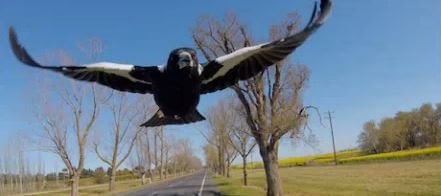Do you have a problem with swooping magpies?

Only a small proportion of magpies swoop on people and these often have a preference for a few individuals that the birds recognise or certain types of ‘targets’ like pedestrians and cyclists. A magpie will only defend its nest within a ‘defence zone’. For pedestrians, this is usually an area within 110m and for cyclists it is 150m. Almost all swoops on people are carried out by male magpies defending their eggs and chicks, which are in the nest for about six to eight weeks between July and November.
Magpies often become more aggressive as the chicks become older, but swooping usually stops once the young have left the nest. A magpie’s defensive behaviour can range from a non-contact swoop with or without beak snapping, through to pecking, dive-bombing and sometimes front-on attacks from the ground. A few attacks are more serious leading to bloodied ears and cheeks or even eye injuries. The risk of eye injury means all magpie attacks need to be taken seriously.
The Department of Environment and Science (DES) provides the following standard public information to calls it receives on how to minimise the potential for a magpie attack and to reduce the consequences of an attack taking place. There are a few techniques that can be used to avoid or minimise the chance of a magpie attack. The best is to simply avoid the territory where magpies are known to be swooping. If you must enter a ‘defence zone’, magpies will be less likely to swoop if they are under constant observation as it is less likely to swoop when it is being watched. Also wear a hat or helmet or carry an umbrella. If you are swooped, do not crouch in fear or stop and do not throw sticks and stones or yell at a magpie as will likely make it more aggressive next time anyone enters the defence zone around their nest.
For further information or to obtain a magpie safety flyer and poster see the Department of Environment and Science (DES) website or phone 13 QGOV (13 74 68).
